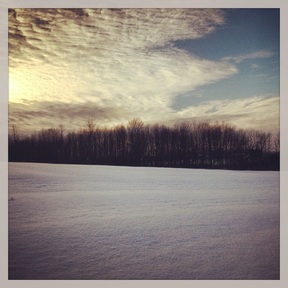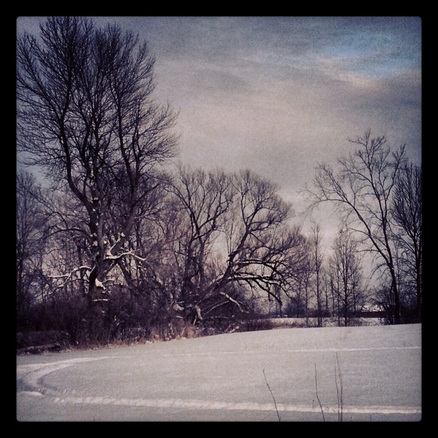 Photo courtesy Sarah Ellen Smith Photo courtesy Sarah Ellen Smith Just over 1200 miles north of here, snow is falling on our would-be farm. Snow again. Starting another solid month of sub-zero nights, icy wind, school cancellations, locally blizzarding conditions. Despite my own weather –– green grass and (more or less) balmy Florida sunshine –– I'm indulging in a favorite wintery pastime of farmers since the dawn of civilization: mooning over seed catalogs. Jeff and I hope to raise some unconventional crops on the 100 or so acres of what was once a dairy farm. (No, for cripes' sake, not weed. Weed is actually kind of conventional these days.). The land has been left fallow for decades, so I am thinking about "forest crops" like hickory nuts, filberts, mushrooms, chokeberries. And hay. Plus apples, which is how this whole thing started -- a quest for apples (close to 100 apple-trees appeared as we explored the land last autumn, the groves emerging as the foliage dropped from the woods around them) and -- of course -- bramble berries. Blackberries grow like weeds up there. Are weeds, most of the time. But the seed catalogues are a delicious distraction. While looking at prices of red clover (to overseed the meadows, since clover captures nitrogen and improves the quality of the ground and the hay) I think, ooh, lupines. And if lupines, then big red poppies. And that patch of torn-up clay dirt, where the neighborly guys down the road took out a few encroaching juniper trees as they mowed the meadow and cleared the path? It would be a great spot to naturalize lupines and poppies and maybe bachelor buttons and these bright young things here, which I've never grown but look really pretty in the catalogue -- With an effort, I snap out of the wishful dreams of flowerbeds yet-to-be. Flowers are not the unconventional crops I mean to cultivate. Not this year anyhow. Okay, maybe a few lupines and poppies. Another catalogue advertises ten blueberry bushes for a mere $35. Blueberries are great. But then as I try to imagine where I could tuck a row of plants –– spaced at least four feet apart, with a different cultivar for cross-pollinization –– into well-drained acidic soil, I am reminded of the magnitude of the challenge. Blueberries require light soil with plenty of organic material and they need a watering system. They cherish a downy comforter of mulch to keep their roots cool and shaded. A raised bed would help them get what they need, most likely, if deer don't immediately mow them down. I add "watering system" and "raised bed area" to the long long list of improvements (deer fencing is already there) to ponder. And turn contentedly back to my short stack of seed catalogues.
11 Comments
Greg
2/9/2014 05:18:48 am
My family used to have a farm with lots of apple trees in NC. Heres a site that you may like and it should lead you to a site for your farms area of the country. we will see ya soon.
Reply
Amy
2/9/2014 07:21:37 am
Hey Greg
Reply
Kate
2/9/2014 09:48:22 am
I'm swept up in your dream. Now *I* want a farm with apple trees and schnozberries. What an exciting adventure this will be for you two, I'm envious! When do you move?
Reply
Kate
2/9/2014 10:25:07 am
Upon further reading, I've noted that you won't be living there... which leaves me hopeful. Perhaps you wouldn't notice if I just took up residence in the beaver lodge...
Reply
Amy
2/10/2014 01:07:11 am
Hi Kate
Reply
george a.
2/10/2014 05:17:54 am
Lupines should grow like weeds up there. They do so in Sweden.
Reply
Amy
2/10/2014 12:52:45 pm
Hi George
Reply
Matt Dalton
1/27/2015 03:22:52 am
I have friends in Ruskin with a blueberry farm. They are currently selling some of their plants. Interesting possibilities for breakfasts.
Reply
Amy
1/27/2015 05:56:04 am
Oooh! Blueberries!
Reply
greg
1/27/2015 09:23:30 am
ok I just saw you needed a repete. only took a year I'll check that box.
Reply
Amy
1/30/2015 04:14:40 am
Thanks for that link Greg!
Reply
Leave a Reply. |
About the Blog
A lot of ground gets covered on this blog -- from sailboat racing to book suggestions to plain old piffle. FollowTrying to keep track? Follow me on Facebook or Twitter or if you use an aggregator, click the RSS option below.
Old school? Sign up for the newsletter and I'll shoot you a short e-mail when there's something new.
Archives
June 2024
Categories
All
|

 RSS Feed
RSS Feed
